“Customer service shouldn”t be a department, it should be the entire company.” -Tony Hsieh
In today’s highly competitive ecommerce landscape, brands need to make every single interaction with a customer count. They should leverage the opportunity to enhance a customer’s happiness and satisfaction quotient. A customer service department alone is not enough. A brand needs effective customer satisfaction strategies to cut through the noise in a crowded market. But first things first, what is customer satisfaction after all and why is it important? Let’s find out.
Customer Satisfaction – Definition
Simply put, customer satisfaction is a way to measure or quantify how happy a customer is with your product, service, after-sales support, or any experience when engaging or interacting with your brand. It reflects how a customer genuinely feels about your brand. CSAT scores, customer satisfaction surveys, and polls are great ways to determine customer satisfaction levels and identify areas that need improvement.
Importance of Customer Satisfaction
A PwC study suggests a staggering 77% of satisfied customers will recommend a brand to friends and family. Another 73% indicate that a positive experience is an important factor in influencing their purchase decisions. What’s more, 17% will stop engaging with a brand after one bad experience and 32% will stop buying from a brand they love, thanks to one bad experience.
These numbers are reasons enough to compel ecommerce brands to make customer satisfaction a top priority. Besides, quantifying customer satisfaction helps a brand:
- Identify strong and weak areas
- Reduce churn
- Generate a positive word-of-mouth
- Build customer loyalty
- Create customer delight
However, we do understand that achieving and maintaining high levels of customer satisfaction is easier said than done. A plethora of factors influence the customer experience and keeping a tab on all customer touchpoints can be cumbersome. The good news, a robust customer satisfaction strategy can help you ace your efforts. Our comprehensive guide on strategies to improve customer satisfaction in ecommerce will provide actionable tips and best practices to help you build stronger relationships with your customers and drive long-term success. Let’s get started.
Action plan to improve customer satisfaction
1) Conduct customer research
In a digitally connected world where information is so easily accessible, losing your customer to a competitor is easier than you had imagined. Retaining those customers is important and one way of doing this is to provide a solution for a problem that your customers are desperately searching for. One way of doing this is to conduct thorough market research and gather insights into what your customers actually want.

Pepper is a bra company manufacturing bras for women with petite chests (catering to cup sizes A, AA, and B). They identified this gap where there were not too many brands catering to women with a small cup size and addressed the need of this user group. Their emails and website clearly give away the message about the problem they are trying to solve as a brand.
Lifesight tip: Do thorough research to identify customer pain points and focus on addressing those.
2) Implementing strategies to improve website usability
70% of Americans shop online. That’s a huge market waiting to be tapped. As an ecommerce store, your website and your mobile shopping app is the biggest asset you must be investing in and focusing on. A simple-to-navigate, pleasing user interface, and a fast-loading-speed website/mobile app are given to ensure a pleasant user experience. Conducting usability testing can help identify pain points and improve navigation, ultimately enhancing the customer journey. A bad website navigation experience can take away 64% of your customers from a competitor.
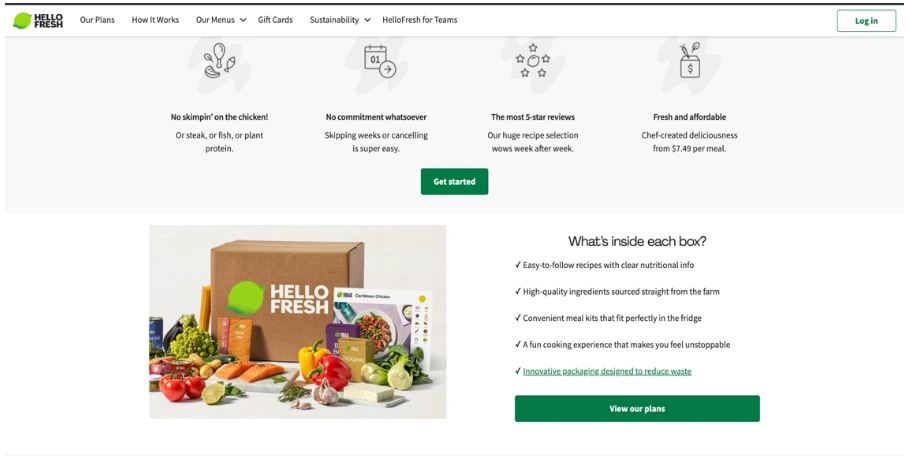
Hello Fresh a meal-kit company has a simple clean website that’s easy to navigate. A clean and simple design is easy on the eyes, and the attractive food imagery is a treat to the eyes and a starving stomach.
Lifesight tip: Make sure to optimize your website for mobiles as a majority of online shoppers shop on their mobile.
3) Enhancing product selection
A wide selection of products leaves a customer confused about what to buy. More than often they may not even explore all the product categories thinking about the sheer amount of time they will have to spend browsing through your online store. However, by sharing product demo videos, personalized product recommendations based on past purchase/browsing history, and displaying customer testimonials on your website you can simplify your customers’ jobs.
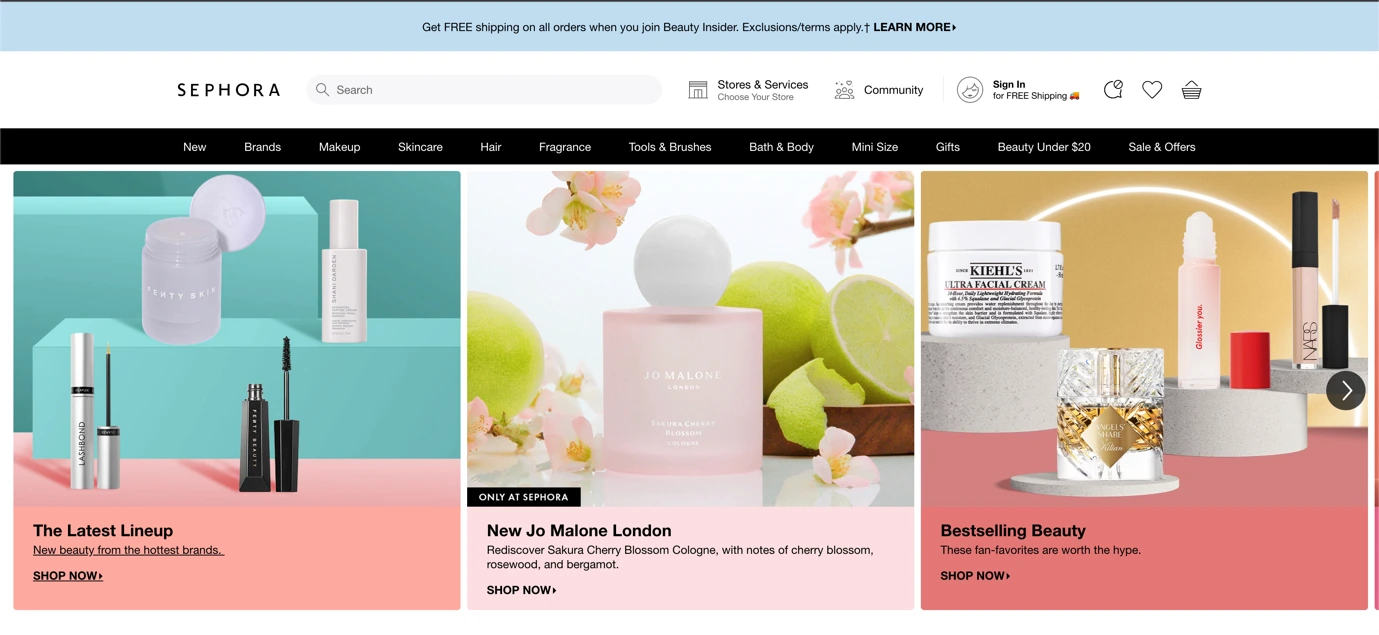
France-based beauty giant Sephora offers skincare and beauty products from over 300 brands. Overwhelming, right? Realizing how confusing this can be, Sephora built a Beauty Insider Community, an online place where members can share their looks, and how-to videos, post questions about products, share product reviews, and do a lot more. Goes without saying members get benefits in the form of points and freebies. Being a user-focussed community there is a humongous amount of user-generated content Sephora has built which plays a vital role in consumer buying decisions. The brand’s official platform has over 21 million followers.
Lifesight tip: Display your top-selling products, products with offers, personalized product recommendation pop-ups, and user reviews.
4) Improve shipping and delivery processes
Unlike in-store shopping where the customer immediately pays and takes the product home, online shopping involves a waiting time between placing an order and receiving the actual product. Make sure to send an engaging and informative (product details, expected date of delivery, delivery address, payment status, shipping mode) order confirmation email within minutes of the customer placing an order. You could use automated email tools for the same. Once the order is dispatched send an email and message with the tracking details and tracking link. The idea here is to keep the customer informed.
Online clothing brand TOBI sends a simple and straightforward order confirmation email with 2 easy to locate CTAs – one for viewing order details and the other for contacting customer care in case of any discrepancy. It also communicates clearly the order processing time.
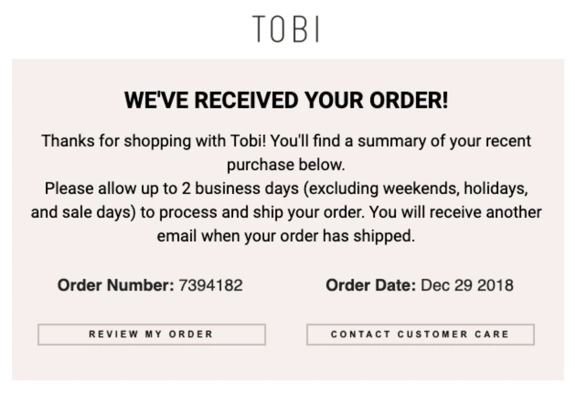
Beauty brand Tarte does a brilliant job by providing a ‘turn on updates’ CTA in their order dispatch email. By opting in, customers get a real-time update on where the shipment is or if there is any change or delay in the delivery.
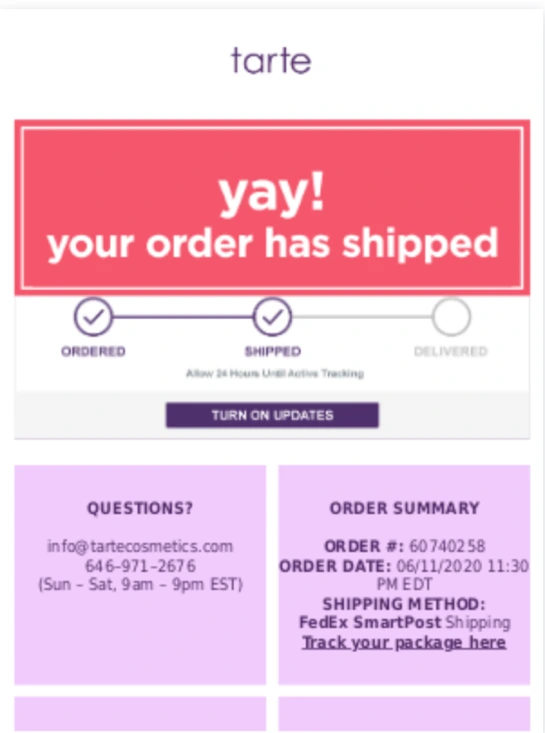
Lifesight tip: Keep the customers proactively informed.
5) Enhance customer service
60% of Gen-Z customers use social media to contact a brand. 71% of Americans connect via phone calls and 48% via emails. In short, people are using more than 2 communication channels to connect with a business. Businesses today need to reach out to customers where they are, which means they need to enhance their customer service capabilities through strategies such as offering multiple support channels (e.g. phone, email, live chat), self-service options, and training customer service representatives.
Lifesight tip: Invest in creating self-help information guides, and FAQs, and integrating chat assistants on your online storefront.
6) Customer feedback
What makes DTC brands stand out from other retailers is the fact that they do not rely on middlemen to access customer information. They have the added advantage of being in direct contact with their customers. These are the people who are evaluating, choosing, and experiencing a brand’s products. Thus by consistently encouraging customers to share feedback brands can get access to a goldmine of information about a customer’s shopping and usage preferences which they can then use to deliver a satisfactory experience at every touchpoint.
Like Warby Parker, it started out as an online glass-wear store offering a variety of frames, free shipping, and hassle-free returns. However, as it was always taking feedback from customers they soon realized that people with complex prescriptions still preferred trying out glasses in a store rather than a free online trial. Three years after they started, they opened their first physical store to tap into this segment of customers. They also expanded their product offering for more high-end glass wear as they realized their customers demanded that.
7) Maintaining ongoing communication with customers
Out-of-sight is out of mind, and this is especially true for online DTC brands. With a plethora of options available to customers keeping customers informed and engaged is important else they would feel abandoned and uncared for and move to a brand that communicates better.

Halfdays a women’s Ski apparel brand does a good job of keeping the conversation live with their existing and new customers. They not only manufacture ski wear that’s comfortable and fashionable, but also run a community of ski enthusiasts to engage them with conversations around ski planning, tips, and tricks, and also use the channel to update them about new product launches.
8) Using incentives and loyalty programs
Everyone likes a deal, a freebie, discount, and your customers are no different. Running loyalty programs is a great way to retain existing customers, acquire new ones, and ensure customer satisfaction.
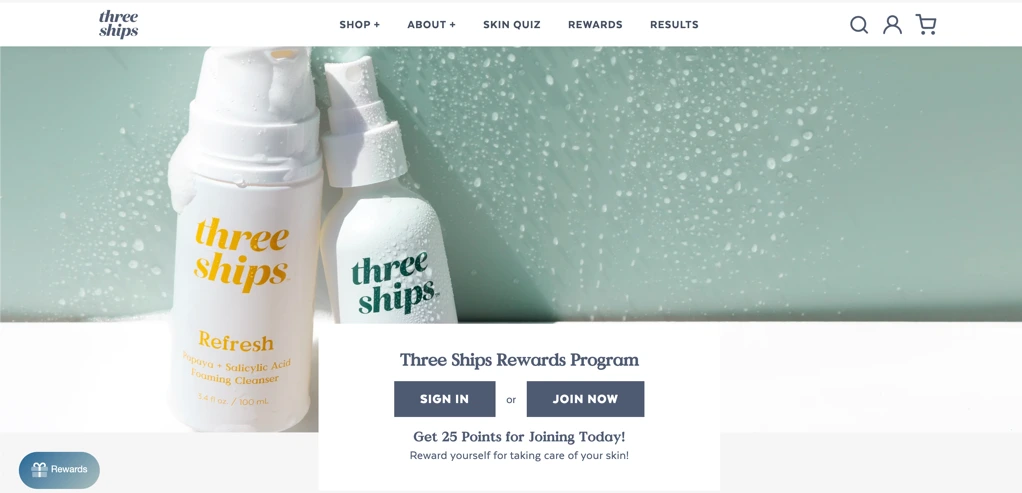
Three Ships, a natural skincare brand for example, runs a community by the name of Fleet and provides discount coupons to customers not only for their own use but also to distribute them to their friends and family. They have thus made their community a way to not just retain customers but also a way to acquire new customers. They also have a Three Ships Loyalty program where every new user gets 25 points on signing up.
9) Monitoring and responding to online reviews
We live in the social media and internet era. Most people check online reviews to make a purchase. Therefore, it’s extremely important for a brand to manage its online reputation, monitor all comments across all online channels, and most important respond to them be it a positive or negative review.

Allbirds, a DTC brand manufacturing comfortable footwear and sustainable eco-friendly products lays great emphasis on sending a prompt response to customers across all online channels. The brand has a dedicated customer service team to monitor and immediately respond to all online reviews and comments on social media channels.
10) Utilize data and analytics
Keeping a tab on your CSAT score is the secret sauce to boosting customer retention and loyalty. Why? Your CSAT is a reflection of how satisfied your customer is with your products and services and also gives insights on areas that need improvement. Individual CSAT scores help identify what’s working and areas that need immediate attention.
11) Address common customer pain points
The online shopping experience is a complete departure from in-store shopping. Brands need to understand this and identify problems customers typically face when shopping online. Some key pain points that customers encounter when shopping online are:
- Inability to physically touch and feel the product
- Inability to try products for size and fit
- Returns and refunds
- Delivery timelines
- Payment gateway issues
DTC ecommerce brands must work towards coming up with a strategy to resolve these issues and to improve satisfaction.

Warby Parker is a company that sells eyewear online. The brand has focused on improving customer satisfaction by offering a seamless shopping experience, with free shipping and free returns, a virtual try-on feature, and a home try-on program that allows customers to try on up to five frames before making a purchase.
12) Importance of Personalization
Today an individual receives 100 emails on average in a single day. That’s a lot of information to process. Add to it the fact that every day your brand is competing with 110,000 plus DTC businesses every day. As a brand, you really need to go that extra mile to engage customers with information that’s relevant to them. Person
alization at every customer touchpoint goes a long way in keeping your customers satisfied and happy.
Butcher Box, a DTC brand, delivers high-quality sustainable meat products. The brand beautifully leveraged the power of personalization to become the well-recognized name it is today. With a limited menu, Butcher Box enables its customers to build their own boxes or choose from a curated set of meal boxes.
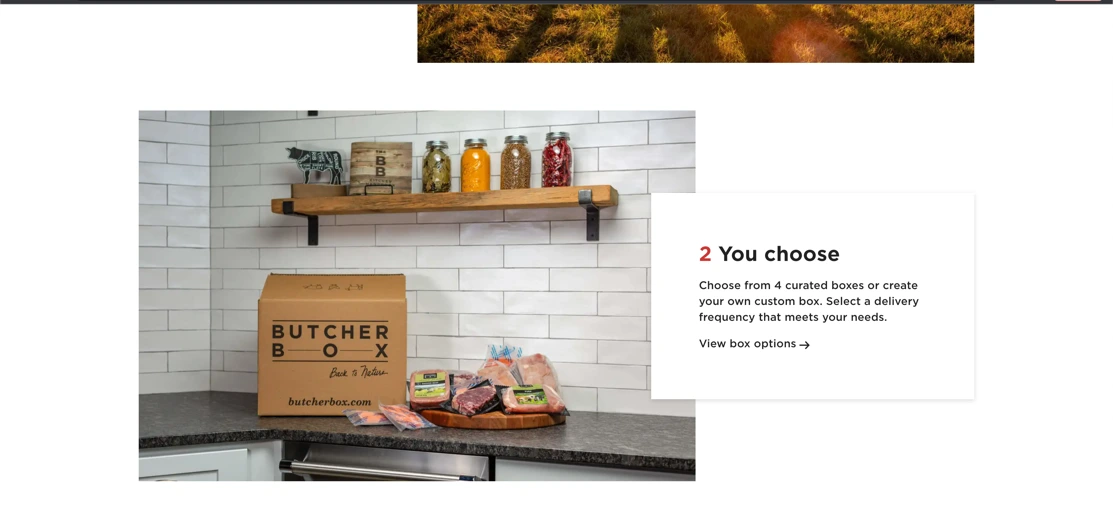
Besides there are several other factors businesses need to keep in mind when it comes to building an effective customer satisfaction strategy such as:
- Striking the right balance between price and value
- Optimizing the role of social media and other online channels to improve customer satisfaction
- Clearly communicating policies on refunds and returns to customers
- Setting up a safe, secure, and convenient payment process
- Not to forget, being proactive and prompt in all customer interactions
The Endgame
DTC brands have brought about a revolution of sorts in how people shop and perceive online brands. So far, they have been successful in leveraging the data they collect from their daily interaction with customers to engage them in a creative and intelligent manner. They have been able to service their customers in an effective manner from the start to finish of a consumer lifecycle.
However, this is not the time to become complacent. Successful DTC brands need to continuously and closely monitor their strategy, make amends where necessary, and keep a laser-sharp focus on driving customer satisfaction and customer loyalty. Ecommerce DTC brands need to tap into the full potential of direct communication with customers, it’s time to step up the game!
You may also like
Essential resources for your success















